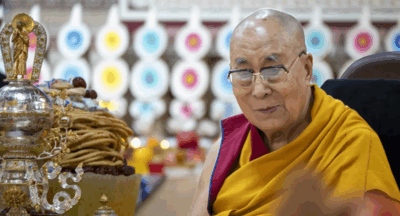On Thursday June 12, Indian diplomacy under the Prime Minister Narendra Modi reached its lowest ebb when India abstained in the United Nations General Assembly from a vote on a resolution demanding an immediate, unconditional and permanent ceasefire in Gaza. The 193 member UN general assembly passed the resolution overwhelmingly with 149 countries in favour, 12 against and 19 countries including India, once the real leader of the global South.
India did not support this resolution at a time when Israel is engaged in genocide in Gaza and other areas of Palestine killing even the hungry and sick people who were going for food and medicines to the aid centres. Even the G-7 members excepting the U.S. have strongly spoken against the latest killings by Israel and they all excepting USA voted for the resolution. But India did not, it abstained.
The 19 countries who abstained included apart from India, countries like Albania, Cameroon, Ecuador, Ethiopia, Malawi, Panama, South Sudan and Togo. These countries are not significant players in UN. All the leading members of the Global South including BRICS and SCO voted in favour of the resolution. USA and Israel, as usual, voted against the resolution.
The Indian abstention from voting in such a critical situation when Israel is in its most aggressive form even without listening to the U.S. President Donald Trump, has triggered a big distrust among the leading members of the developing countries as also the two big powers Russia and China. The next summit of BRICS will be taking place in July this year in Brazil. Prime Minister Narendra Modi will be attending that. Israel’s action including its attacks against Iran on June 13 will also be on the agenda. How Can Indian Prime Minister face the other members of the BRICS at the summit on the issue of Israel and Gaza?
In the explanation of vote on the resolution titled ‘Protection of civilians and upholding legal and humanitarian obligations”, India’s permanent representative to the UN, ambassador Parvathaneni Harish said the resolution comes against the backdrop of worsening humanitarian situation in Gaza.. He then said India is deeply concerned at the deepening humanitarian crisis and condemns the loss of civilian lives but a joint effort should be directed towards bringing the two sides closer. So, India would abstain from the resolution.
What an argument under the new normal Modi doctrine? Everyone knows what is the latest attitude of Israeli Prime Minister Benjamin Netanyahu to any bilateral talks? The immediate need is to save the lives of Gaza people and organize humanitarian aid for sick and hungry. The ceasefire is imperative for that. 149 countries out of the total of 193 members supported the resolution on the basis of this understanding. They wanted to stop the killings with immediate effect.
The resolution demanded that Israel, the “occupying power”, immediately end the blockade, open all border crossings and ensure that aid reaches the Palestinian civilian population throughout the Gaza Strip immediately and at scale, in line with its obligations under peace international law and humanitarian principles. It seems that the Narendra Modi government has objection to the term “occupying power” given to Israel. Even France, Britain are agreeing to this resolution, why not India?
The resolution demanded that the parties fully, unconditionally and without delay implement all the provisions of Security Council resolution of June 2024, including an immediate ceasefire, the release of hostages, the return of the remains of hostages who have been killed, the exchange of Palestinian prisoners, the return of Palestinian civilians to their homes and neighbourhoods in the Gaza Strip and the full withdrawal of Israeli forces from the Gaza Strip.
The UNGA vote came after the 15-nation Security Council failed to adopt a similar resolution last week after the sole veto by permanent member the United States. For the active members like South Africa and Brazil, there was no other way but to organize a fresh resolution for voting in the UN general assembly where the resolution is decided by voting and no veto power is allowed. On Thursday, the draft resolution was moved by Spain which is a member of the European Union. Prime Minister Sanchez belongs to the socialist part of the coalition and Deputy Prime Minister is Yolanda Diaz, a prominent leader of the Communist Party of Spain.. Spain could organize most members of the European Union in favour of the Resolution.
The latest Israeli attack on Iran on Friday and the possibility of the war spreading with serious implications for the Middle East as also global peace poses another challenge to the Prime Minister Narendra Modi. The PM has cultivated special relations with Israel while Iran is very crucial from India’s geopolitical strategy. It will be another big challenge to PM’s diplomatic acumen. (IPA Service)


 BOAC Comet Jet Breaks Apart After Storm Lift‑Off from Dum Dum
BOAC Comet Jet Breaks Apart After Storm Lift‑Off from Dum Dum 